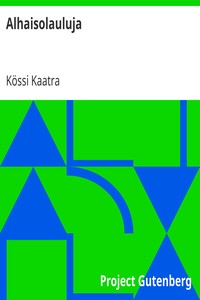| Summary |
"Alhaisolauluja" by Kössi Kaatra is a collection of poetry likely written in the early 20th century. The work captures themes pivotal to the Finnish socio-political landscape, especially in the context of labor struggles, revolutionary ideas, and the collective plight of the working class. Through powerful verses, Kaatra gives voice to the experiences, hopes, and struggles of the proletariat, often invoking historical and mythological references to deliver a profound commentary on societal conditions. The opening of "Alhaisolauluja" sets a dramatic tone, combining a sense of urgency and passionate rhetoric. The collection opens with a striking proclamation, emphasizing a "purkaus" or eruption of emotion paralleling societal upheaval, juxtaposing themes of despair and hope. Kaatra vividly portrays the rallying symbol of the "punalippu" (red flag), a key representation of revolutionary spirit for the oppressed, as it soars over a gathered populace, embodying their aspirations for freedom and equality. Each poem—including notable pieces like "Esitaistelijat" (The Early Fighters) and "Vappusäkeitä" (May Day Verses)—appears to encapsulate the fervor of a people's struggle, with calls for action, remembrance of the past, and a yearning for a just future, paving the way for deeper explorations of identity and resistance throughout the collection. (This is an automatically generated summary.)
|

